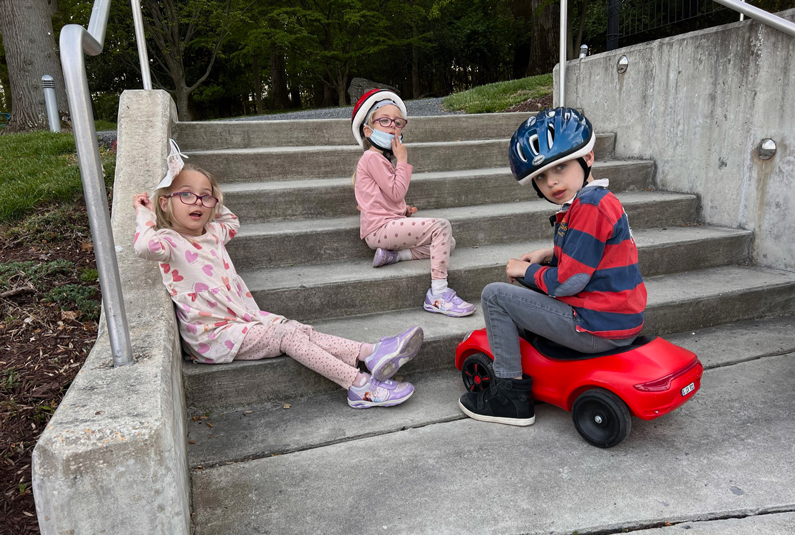Diagnosis to treatment: three siblings from Sweden return to the Clinical Center
Researchers study their rare genetic disorder

The Flysjo family from Sweden are a recent example of the reach and influence of the Clinical Center's rare disease research and how this research impacts the lives of people worldwide. Their journey started with concern about developmental delays in their two-year old son, Hampus. They eventually found the cause: GM1 Gangliosidosis, an exceedingly rare and ultimately fatal inherited neurodegenerative disorder. A devastating diagnosis, this news was compounded by learning their younger twin daughters, Isabella and Julia, also had GM1.
After receiving the diagnosis, parents Niclas and Jessica Flysjo quickly shifted from shock to action. They learned of NIH's National Institute of Human Genome Research Institute (NHGRI) first-in-human gene therapy study for GM1. All three children were admitted to the study, but yet another challenge arose: the COVID-19 pandemic. In an attempt to slow the spread of the virus, the U.S. government decided to close its border to foreign travelers. Determined to do what they could for their children, the Flyso family arrived on one of the last flights into the United States before cross-Atlantic travel was paused.
Once at NIH, the Flysjo children received experimental intravenous injections aimed at making their bodies produce an enzyme needed to slow or even halt their neurodegenerative condition. They recovered at the Children's Inn for six-months and then returned to Sweden.
In the midst of the diagnosis, travel and treatment in a foreign land, the NIH campus provided a respite for the family.
"We were struck by how beautiful the building and surroundings are and we much appreciated how all of the staff took such good care of us. To be greeted with a smile and a friendly ‘Hello!' can really make a difference when you're having an otherwise difficult day," said Niclas.
Experimental treatments require periodic re-evaluation - for this study, the family has returned to the Clinical Center twice a year, with future visits planned annually for the next three years.
"We are pleased to learn there are no unexpected developments, but the best news is the treatment has considerably slowed down the disease progression. MRIs show promise and we've observed that the children are learning new skills, but more importantly not losing any acquired skills," added Niclas.
"The kids look great," said NHGRI deputy clinical director Dr. Cynthia Tifft, who has been studying GM1 for more than a decade as part of a natural history study.
"Not every child has done well with this [treatment], but these three children have done exceedingly well. How long that will last, I don't know," added Tifft.
"For these return visits, it's more than just brain MRIs – there are many other studies, including sleep studies, X-ray studies, ultrasounds and physical therapy. We do try explain to them what is about to happen before they go for a procedure although we know their understanding is limited because of their age and condition," summarized Niclas.
"Back in Sweden, we continually work towards having the children retain the progress they have made."
On every visit, the Flysos have noticed the competence and professionalism of everyone they interact with – doctors, nurses, technicians and related support staff.
"For all the questions we have had about this disease and the treatment we are receiving, everyone has been able to answer these questions in a way we can understand. We feel we are in very good hands at NIH – really the best place possible for receiving treatment and at the same time helping to add to what is known about GM1."
The family will return to the Clinical Center in April 2023 for ongoing evaluation of this experimental therapy.
Hear more from the Flyso family in their presentation at the 2020 rare disease day symposium.
- Robert Burleson